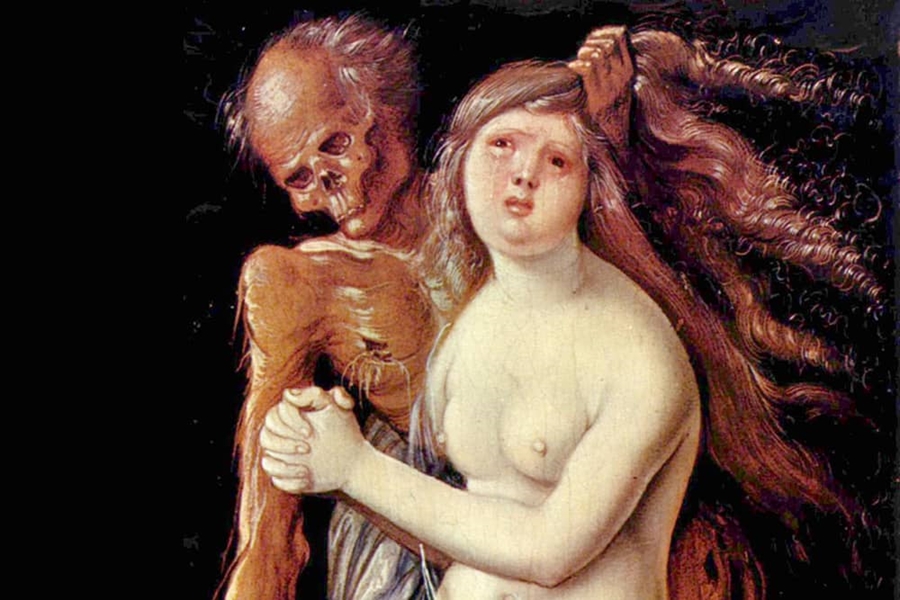Today art is associated with museums and galleries, but in early modern Europe, people believed art was closely tied to the fate of their immortal souls.
Distinguished Professor Lynn Jacobs will explore this phenomenon in her public preview lecture, “Death and Art,” which will be offered online via Zoom at 5:15 p.m. Wednesday, Oct. 12.
Jacobs’ lecture will preview her Spring 2023 Honors College Signature Seminar, Death and Art. Please fill out this online interest form to gain access to the lecture.
An Early Fascination
In the 14th through mid-16th centuries in Europe, death was a very visible part of life. People had an average life span between 30 and 40 years, and about half of all children died before the age of 16. Thus, art from the time shows a fascination with death.
“The last phases of the Middle Ages and the beginning of early modernity were a very turbulent, really interesting transitional period,” Jacobs said. “As we all know, transitions are difficult, and I think that’s the reason why there is, in northern European art, this fascination with the macabre. And that’s why death becomes such an important theme and issue in their art.”
A Good Work
Medieval Christians were terrified about what future awaited them after death. They sought comfort in art, though not for aesthetic reasons, rather that they believed art could help secure the proper spiritual future for their souls.
“One of the things that really interests me about art of the past is its important power, its significance,” Jacobs said. “In that period, art had the power to affect the salvation of your soul.”
Commissioning art constituted a “good work,” and good works could help achieve salvation after death. Even more importantly, in the papal economy of salvation, prayers before images the pope had declared “indulged” released souls from the torments of purgatory.
“In addition, images, epitaphs and tombs served as reminders to the living to pray for the deceased and thereby also shorten their time in purgatory,” Jacobs explained. “This was really a matter of life and death for these people.”
A Wide Range
Designed to introduce students to art of Northern Europe in the 15th and 16th centuries, the course will examine different sites and artistic genres that functioned in relation to death, such as chapels, monasteries, altarpieces, tombs, epitaphs and books, before examining artists who focus on themes of death, such as Holbein, Bosch and Bruegel.
“There’s nothing in this course that I’m not excited about,” Jacobs said. “It’s just extremely interesting material. One component I’m especially excited about is student presentations on pre-selected themes and motifs related to death, such as Death and the Maiden, the Dance of Death, skulls, skeletons, suicide, war, capital punishment, the Fall and the Death of Christ. I tried to pick a wide range of themes, and I’m excited to hear where students from different disciplines take them.”
About Lynn Jacobs
Jacobs is a specialist in the art of Northern Europe in the 14th through mid-16th centuries. She has published four books on topics ranging from liminality in Netherlandish art to German 15th-century triptychs. She is currently working on a fifth book on Hieronymus Bosch’s images of hell. In addition, she has written numerous articles on Netherlandish painting, sculpture and manuscript illumination.
Jacobs has received research grants from the Belgian-American Educational Foundation, two major fellowships from the National Endowment for the Humanities and a research fellowship from the DAAD (Deutscher Akademischer Austauschdienst). In 1990 she was awarded the Arthur Kingsley Porter Prize, presented by the College Art Association for an especially distinguished article published in The Art Bulletin.
Signature Seminars Explore Diverse Topics
Death and Art is one of three Honors College Signature Seminars scheduled for Spring 2023. Other topics to be explored include The Science, Politics and Culture of Dinosaurs, taught by Celina Suarez, an associate professor of geosciences, and Soccer, taught by Todd Cleveland, associate chair and director of graduate students in the Department of History.
Deans of each college may nominate professors to participate in this program, and those who are selected to teach will become Dean’s Fellows in the Honors College.
Honors students must apply to participate, and those selected will be designated Dean’s Signature Scholars. The course application is posted online on the Signature Seminars web page. The deadline to apply is Monday, Oct. 31.
About the Honors College: The University of Arkansas Honors College was established in 2002 and brings together high-achieving undergraduate students and the university’s top professors to share transformative learning experiences. Each year the Honors College awards up to 90 freshman fellowships that provide $80,000 over four years, and more than $1 million in undergraduate research and study abroad grants. The Honors College is nationally recognized for the high caliber of students it admits and graduates. Honors students enjoy small, in-depth classes, and programs are offered in all disciplines, tailored to students’ academic interests, with interdisciplinary collaborations encouraged. All Honors College graduates have engaged in mentored research.
About the University of Arkansas: As Arkansas' flagship institution, the U of A provides an internationally competitive education in more than 200 academic programs. Founded in 1871, the U of A contributes more than $2.2 billion to Arkansas’ economy through the teaching of new knowledge and skills, entrepreneurship and job development, discovery through research and creative activity while also providing training for professional disciplines. The Carnegie Foundation classifies the U of A among the top 3% of U.S. colleges and universities with the highest level of research activity. U.S. News & World Report ranks the U of A among the top public universities in the nation. See how the U of A works to build a better world at Arkansas Research News.
Topics
Contacts
Lynn Jacobs, distinguished professor
School of Art
479-575-5202,
Hiba Tahir, senior editor
Honors College
479-575-7678,
Kendall Curlee, director of communications
Honors College
479-575-2024,
